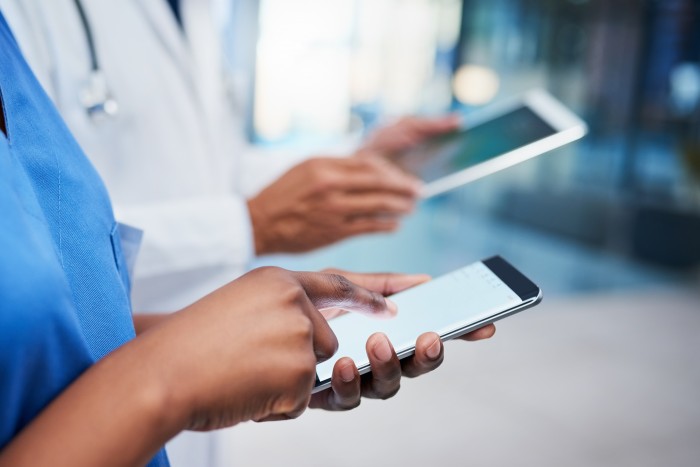KLAS: Apple iPhones most-used commercial devices in healthcare
Most healthcare organizations use Apple devices to boost clinical mobility because their employees already use them outside of work, KLAS research shows.

Source: Getty Image
- Commercial-grade devices from Apple and Zebra Technologies are the most widely used among healthcare organizations, according to a new KLAS report.
The KLAS Clinical Mobility Shared Smart Devices 2024 report examines the use of retail and commercial-grade devices within healthcare organizations and customer satisfaction with vendor performance. Over the last 12 months, KLAS researchers interviewed 80 healthcare organizations using shared smart devices to enhance clinical mobility.
Most organizations interviewed for the report used Apple (64 percent) or Zebra Technologies (16 percent) smart devices. Samsung trailed behind, with 8 percent of organizations saying they used the vendor’s smart devices. Only 6 percent of organizations used Vocera devices, and 5 percent used Spectralink.
Though Apple devices often lack capabilities that meet specific healthcare needs, respondents said they chose Apple because the devices work well with mobile device management solutions, most of their employees already use Apple outside of work, and many IT vendors develop solutions that work with Apple before other operating systems.
The report also notes that Apple iPhones are more broadly used than iPads. Of 91,004 commercial-grade smart devices used across the organizations interviewed, 57 percent used iPhones, while only 3 percent used iPads. This is likely because most clinicians “prefer using a smartphone while they walk through the hospital,” the report states. Also, customers noted that the iPhone’s high-quality camera is beneficial for clinicians documenting patient health via pictures or videos.
However, customers also noted that the size of Apple iPad tablets improved EHR usability and were lighter than laptops. Still, customers said they want iPads that better integrate with other healthcare solutions, such as patient monitors and alarms, at lower prices, noting that iPads are more expensive than other tablets.
Additionally, respondents said Apple's lack of support and device warranties is a significant limitation for those using iPhones or iPads.
Zebra Technologies’ market share followed Apple’s due to recent purchases from several large health systems. The vendor’s customers cite the devices’ “rugged features” and “cross-industry footprint” as the primary reasons for selecting Zebra Technologies. Device ruggedness is critical for care teams as the devices must be sanitized frequently and survive mishaps like being dropped. Though Ascom, Spectralink, and Zebra Technologies all offer sturdy devices, Zebra Technologies has emerged with a larger market share because of the large customer base for their other offerings, such as printers and scanners.
However, some customers note that Zebra’s device durability makes the devices slightly bulkier than other retail phones and that the speaker grills are easily clogged.
Samsung has been unable to make as big a dent in the clinical mobility market as organizations want devices their users are already familiar with. While customers appreciate the low cost, small device size, and cross-industry adoption that Samsung offers, Apple’s broader market penetration has stemmed the adoption of Samsung devices within hospitals.
Besides these commercial-grade smart devices, Apple and Samsung appear interested in developing healthcare-specific capabilities for their smartwatches.
Samsung announced last October partnerships with several healthcare organizations to conduct research into the use of smartwatches and algorithms in healthcare. The company plans to use the research findings to develop its technology to support the healthcare industry. For instance, the company will collaborate with Tulane University School of Medicine to utilize the Galaxy Watch’s BioActive sensor and machine-learning approaches to monitor various cardiovascular disease indicators.
Apple has announced in recent years that it would add various capabilities to the Apple Watch, including atrial fibrillation (AFib) history recording and medication tracking capabilities. The company then added a feature that enables blood oxygen readings to its Apple Watch Series 9 and Apple Watch Ultra 2, but the sale of these devices was halted due to a patent dispute with medical technology company Masimo.
